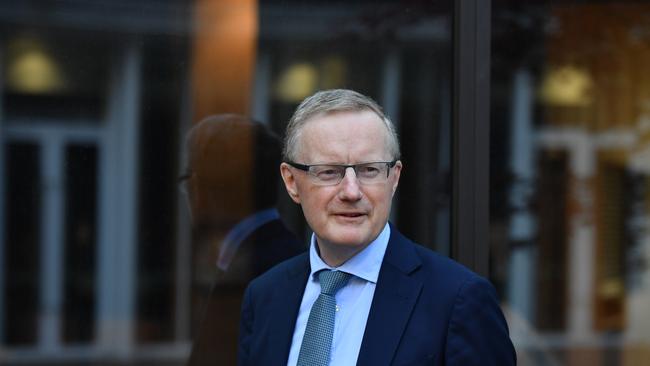
As retailers move into the critical pre-Christmas spending period, consumer sentiment is paramount.
The Reserve Bank governor’s comments issued after Tuesday’s board meeting, the last for the year, are much more positive than they have been for some time.
Not champagne-cork-popping, but after a year of negative sentiment and three rate cuts since mid-year, the board is trying its best to look for economic green shoots.
Not only do we have a continuation of the “gentle turning point” being enjoyed by the Australian economy at the moment, the central bank now believes that some of the downside risks facing the global economy “have lessened recently”.
The bank has also reported that its cash rate, which is at a record low of 0.75 per cent, has continued to put downward pressure on the exchange rate, “which is supporting activity across a broad range of industries”.
“It has also boosted asset prices, which in time should lead to increased spending, including on residential construction.
“Lower mortgage rates are also boosting aggregate household disposable income which, in time, will boost household spending,” it says, in more positive words that were not in the November statement.
While the central bank has confirmed that it is prepared to ease monetary further “if needed to support sustainable growth in the economy”, it is clear from the statement as well as comments by Lowe in his recent speech that it does not want to move towards a regime of negative interest rates and quantitative easing.
As has been discussed in detail around the world in recent months, there are limits to the effectiveness of monetary policy in an ultra-low interest rate regime.
Lower interest rates also provide mixed signals.
While they may stimulate the housing market, as we have seen in recent months, they can also worry consumers and business about the underlying state of the economy.
HSBC’s chief economist Paul Bloxham reflected the tone of the RBA statement, which he said was Lowe “trying to deliver Christmas cheer”.
“It makes sense,” he said, “that the central bank would seek to provide a positive narrative just before its two month Christmas break. “The statement suggested that the RBA seems satisfied that the first stages of the monetary policy transmission mechanism are working, but that it will take some time for the ultimate impact on the economy to be seen.”
Three major positive economic factors have become apparent in recent months and are feeding into the tone of Lowe’s statement.
The housing markets in Sydney and Melbourne appear to be recovering from their depressed mood earlier in the year, particularly in the lead-up to the May election when Labor was expected to win and abolish negative gearing.
Add that to three 25 basis point rate cuts in recent months and promises of more to come if needed, and homebuyers in the country’s two major capitals have returned to their weekend auctions with a lot more confidence than they have had in some time.
The CoreLogic national home price index was up by 1.7 per cent in November, the biggest rise in 16 years.
Externally, as the RBA statement notes, global sentiment is not as bad as it has been.
Markets seem to have become inured to President Trump’s trade war threats and his continued belligerent rhetoric towards China and other countries.
Despite talk of a modest “Phase 1” trade deal between China and the US being struck, nothing has emerged so far. But world markets, which not too long ago hung on every twist and turn of the Washington-Beijing trade war, have become used to the situation.
Expectations of a deal are low and the world is somehow learning to work around the prospect of a semi-decoupling of the US and Chinese economies.
While a trade deal would be good, moves by the Chinese government to stimulate the economy have helped to cushion it from the worst of the long-running trade war.
While the Chinese economy is slowing, it is not collapsing in a heap in the face of Trump’s accusations and tariffs.
China has learned not to overreact to Trump’s rhetoric.
Recent figures from China, Australia’s largest trading partner, have shown factory activity in the country showed signs of improvement in November with growth picking up to a three-year high according to the Caixin/Markit manufacturing Purchasing Managers’ Index.
The survey and a strong official Purchasing Managers Index released recently show that while the worst may not be over for Chinese manufacturing, it has been more resilient than expected, benefiting from economic stimulus measures.
Interlinked with this is the third more positive factor: exports.
A combination of a lower dollar, iron ore supply issues in Brazil and continued strong demand from China has helped Australia’s export sector.
Figures released on Tuesday show the current account was in surplus by $7.9bn in the September quarter, with the surplus over the year to September coming in at a record $3.9bn.
CommSec economists estimate that net exports will help hold up economic growth figures, due to come out on Wednesday, by 0.2 percentage points.
The market’s next focus is Wednesday’s economic growth figures for the September quarter.
While there are continued risks both domestically and overseas, the message from Martin Place on Tuesday was clear: as Australians head for their Christmas break, may the “gentle turning point” continue.




Harvey Norman executive chairman Gerry Harvey will be happy with Reserve Bank governor Phil Lowe’s latest statement.